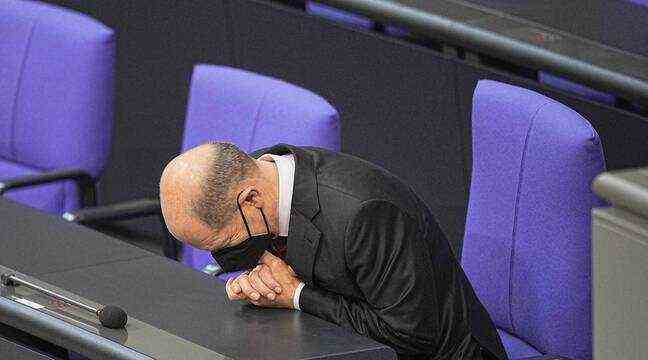After the discussions, it’s time for action. This Wednesday, Olaf Scholz was appointed Chancellor by the German Parliament. The Angela Merkel page is definitively closing and the Social Democrat will now have to meet many challenges while dealing with a coalition government formed with the Liberals and the Greens. A whole program with its share of ambitious promises and difficulties ahead.
What are the immediate challenges?
Before even taking office, the new government had to start dealing with the new epidemic wave that has befallen Germany. Under pressure, Olaf Scholz and his team were forced to renege on several campaign promises. They thus approved a battery of restrictions and accepted the idea of compulsory vaccination. The measure could be voted on this week and enter into force at the beginning of 2022. But discontent is already starting to rise in part of public opinion. Olaf Scholz and his government have the “great responsibility” to fight against the outbreak of Covid-19 in the country, said on Wednesday Frank-Walter Steinmeier, President of the Federal Republic. “Do not let the pandemic divide us for the long term”, he also launched, in this context of mobilization against the vaccine obligation, supposed to come into force in February or March. We have known better as the start of a mandate …
How to pass after “Mutti” Angela Merkel?
Taking the place of a chancellor in place for sixteen years, whom the Germans called “Mutti” (affectionate nickname for “mother” in German), in a country where stability is appreciated, is not going to be easy. Nevertheless, Olaf Scholz has the advantage of “reassuring both the elderly and the social democratic voters”, explains Paul Maurice, researcher at the Committee for the Study of Franco-German Relations (Cerfa) of the French Institute of International Relations (Ifri). With the Liberals and the Greens who embody another segment of the population, a little younger, there is finally “a rather complementary team which allows a form of renewal and also a certain continuity after Angela Merkel. It is the change in continuity as Pompidou said in 1969 ”, concludes the expert.
Ecological and social change?
Despite this new chancellor, we should not expect radical changes in Germany, which is rather the land of compromises. On the other hand, several evolutions should emerge in the long term in the fields of ecology and social. “The Greens have a strong and ambitious ambition for ecological transition” with an exit from coal hoped for in 2030 and a broad development of renewable energies, underlines Paul Maurice. However, the program of the three parties remains vague on the financing of these measures to fight against global warming.
Olaf Scholz will also be eagerly awaited on social measures “which moreover made him rise in the polls during the campaign”, underlines the researcher at Cerfa. Among them, the guarantee of stable pensions and especially the increase in the minimum wage to 12 euros against 9.6 euros currently. “These are projects that reassure the Germans about the future”.
Attracting young people, another challenge?
“Olaf Scholz does not have an overflowing charisma, recognizes Paul Maurice. He is an elderly man, who rather embodies traditional politics. Several measures planned by the coalition government should however make it sexier with German youth, such as the legalization of cannabis for adults or the lowering of the right to vote in legislative elections to 16 years. The government will also be eagerly awaited on the issue of digital and technological transition. At this level, Germany has fallen far behind and there is real expectation among the population, especially among young people. “This is a question on which the Greens have an ambitious program because they consider that the ecological transition goes hand in hand with the digital transition”, comments Paul Maurice.
A turning point in German diplomatic relations?
A priori, relations with France have a bright future ahead of them according to the message published this Wednesday on Twitter by Emmanuel Macron who greeted the election of the new German chancellor, promising him to write “the rest together”. Berlin has also sided with France for a more assertive defense of European interests on the international scene. A file that will perhaps be on the menu of the first official meeting between Emmanuel Macron and the new chancellor which is to take place on Friday, in Paris.
Overall, “there will be continuity in current diplomatic relations because the three parties are in favor of maintaining German trade internationally”, analyzes Paul Maurice. With the possible exception of a few countries because “there will be a hardening of positions vis-à-vis certain great powers on issues related to respect for human rights”, assures the expert. On this subject, the new Minister of Foreign Affairs, the ecologist Annalena Baerbock, has thus promised a firmer policy than under the Merkel era in the face of authoritarian regimes like Russia and China. She did not rule out a boycott of the Beijing Olympics.

